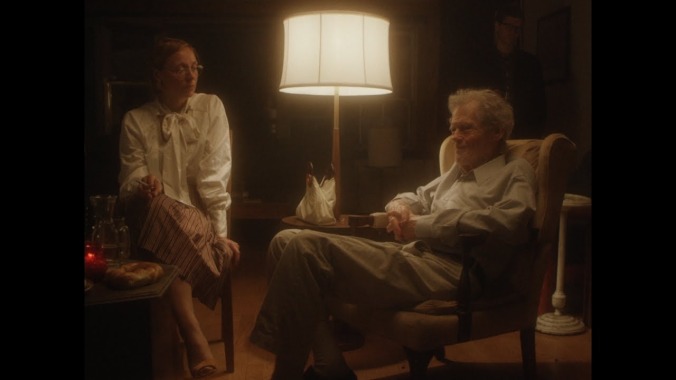The new Protomartyr record sounds as bleak as everything feels

You haven’t heard a moment in music this year quite as bilious as when in “Windsor Hum,” after 90 seconds of tense, dissonant guitar, the sky ruptures and Protomartyr singer Joe Casey sneers “everything’s fine,” letting the “n” ring like a bell as a plague of vapor descends. The song is named after a phenomenon in Windsor, Ontario, where an omnipresent low-level hum has mystified and tortured residents for years. They don’t know where it is or what it comes from, though they suspect it’s from the massive, smog-belching machinery chugging away across the river, in Protomartyr’s post-industrial hometown of Detroit. When Casey hisses “everything’s fine,” he’s speaking not just as the bullish, patronizing American corporations, but as the town’s residents, too, telling themselves that there’s nothing to worry about, that the subsonic hum is normal, even as it shatters eggs in the fridge.
The sentiment isn’t hard to place. Casey’s explicitly evoking, with his usual blend of high-mindedness, sardonicism, and anti-elitism, the dog sitting amid a flaming house muttering “this is fine,” as well as the gotta-hear-both-sides political rhetoric that’s managed to make a white supremacist president into a matter for measured debate. “Windsor Hum” is a centerpiece moment on an album as fractured and despairing as the American dialectic itself, and matched to music that is finally as overwhelmingly bleak as Casey’s lyrics have always been. On 2014’s Under Color Of Official Right, the post-punk four-piece traded in tight, wiry riffs and at least the imagery of wintry Detroit bars; on 2015’s Agent Intellect, as Casey turned lyrically toward religion, death, and the nature of evil, the band grew more spacious, etching out dark countermelodies to his musings. But the new Relatives In Descent is an album of apocalyptic vision, of late-capitalist desolation, beaches full of bones, atomized discourse, poison clouds and soil, and foul trumpets blasting like bombs. Casey spits these lyrics in his rounded baritone speaking voice, varying between elegy (“A Private Understanding”) and jeremiad (“Up The Tower”), from prophetic shouts to harrowing sneers, often on the same track.
The band sets these musings in a gloaming din of guitars, sometimes buttressed by the faint trill of stringed and brass instruments, a darkness through which they occasionally send serrated lead-guitar lines swirling like a lightbulb on a string. These cathartic moments can feel as thrilling as anything the band has produced: Tracks like “My Children” and “The Chuckler” feature jangly, echo-laden ear-worm guitar lines, while “Male Plague” and “Don’t Go To Anacita” are bar-band punk-rock of the first order. Even the moments of fleeting victory, like the echoing regicide of “Up The Tower” or the haunted beauty of “Night-Blooming Cereus,” collapse in darkness by the time they’re over. It’s devastating music uniquely attuned to our current cultural moment, stridently political but less interested in dictating the problems or their solutions than in mapping the emotional topography of being alive and terrified in 2017. It begins and ends with the same image: of a distant relative standing in utter darkness, calling out through time, “Just trying to reach you.” Casey’s voice betrays nothing; the closest we get to hope is the fact that she’s trying at all.